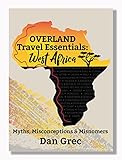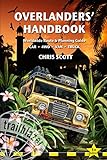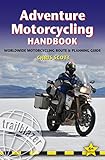Overland Mali Travel
West Africa > Mali
Currency to display:
Contents
- 1 Visiting Mali
- 2 Entering Mali with a Car or Motorbike
- 3 Driving in Mali
- 4 Gas price in Mali and Diesel price in Mali
- 5 Safety and Security Considerations
- 6 Camping in Mali
- 7 Navigation
- 8 Special Overland Travel interests
- 9 Vehicle Maintenance
- 10 Buy or sell a car or motorbike in Mali
- 11 References
- 12 Helpful External links
Visiting Mali[edit]
Mali is a big country. Recently there have been some problems in Mali and a lot of travelers have asked me : is Mali safe? My answer ( and I live there) is YES! That is, most of Mali is safe, but for a few areas in the very north east. All other areas are perfectly safe and very nice to visit. Mali has a very friendly and open population who will welcome you. There is a lot of space and nature in Mali, many adventurous tracks trough bush with the occasional local village. Yes it might be hot, it might be wet, depending on the season, but its always safe. If you want to know more about Mali contact me through my website http://www.coolcampmali.com]
Entering Mali with a Car or Motorbike[edit]
Correct as of: November 2016
Travel Visa for Mali[edit]
The visa for Mali is extremely easy to obtain at virtually any bordering country.
The Embassy in Nouakchott Mauritania is friendly, and the process is very easy. Expect to pay UM6,500.00 MRO for one month single entry. (Must be paid in Mauritanian Ougiyas)
Coming from the South, get the visa in Brazzaville, Congo for $50.00 USD
Required Paperwork[edit]
- Passport of registered owner.
- Drivers license of registered owner.
- Original vehicle registration.
- Proof of vehicle insurance - they might not ask for it, but it’s better to have it.
- (OPTIONAL) Carnet de Passage
(no copies are required)
Process at border[edit]
Mali has one of the easiest borders in Africa.
If you are at a main border you either get your Carnet de Passage stamped or buy a lesé pasé touristique. This allows your car to be in Mali for 30 days.
Cost of entry[edit]
With a valid Carnet de Passage entry should be free.
If you don’t and get a lesé pasé touristique instead, they cost FCFA5,000.00 XAF. Some borders will try to double that price late in the afternoon and on Sundays.
Permitted length of stay[edit]
30 days.
Extension of stay[edit]
To extend a Lesé Pasé you will need to visit the main custom office in Bamako BEFORE the document has expired. There is no need to bring your vehicle. Bring the Lesé Pasé, your car papers and your passport. The head of customs will stamp and extend it for one month, and he makes it clear he won’t do it again.
To find the office, talk to the driver “Omar” from The Sleeping Camel, he knows exactly where to go, and the head of customs kind of knows him, so the process is painless and free.
Storing a vehicle and temporarily leaving the country[edit]
No problem if you return before the Lesé Pasé expires. If it’s going to expire, explain yourself to the head of customs, and he’ll find a way to make it work for you. He’s very reasonable and it can be done. Leaving the vehicle at The Sleeping Camel worked well.
Exiting with a vehicle[edit]
- Hand in your Lesé Pasé to Duane.
- Get yourself stamped out at immigration.
All should be free.
Driving in Mali[edit]
Recommended books for Overlanding in Mali[edit]
Travel insurance for Mali[edit]
World Nomads offer the most flexible Travel Insurance at the best prices for multi-country / multi-year trips. You can buy, extend and claim online, even after you've left home.
Vehicle insurance requirements[edit]
Liability Insurance is required, and the police might ask repeatedly to see it.
If you travel through more west African countries get a 'Carte Brun' which is valid in most west African countries at no extra cost.
Cost of vehicle insurance[edit]
Expect to pay CFA10,000.00 XOF to CFA20,000.00 XOF per vehicle per month, depending on engine size and vehicle age (newer costs more)
Where to purchase vehicle insurance[edit]
Unknown within Mali.
Driving license[edit]
Anything from your home country will be accepted.
Driving side of road[edit]
Right.
RHD vehicles can be driven in Mali.
Mandatory items in vehicle[edit]
You need two safety triangles, first aid kit, and fire extinguisher. Better to have them to avoid bribery.
Roads[edit]
General Road quality[edit]
The main highways are good pavement, without potholes, especially those recently built.
Minor dirt roads are frequently horrible, especially in towns. Lots are impassable in the rainy season.
Always watch out for potholes on sealed roads - they can be HUGE, and hitting them fast will be very, very bad.
Road signs[edit]
Not overly common, but on the highways they usually show the distance to the next major town.
Toll roads[edit]
The main paved highways are all toll roads, you will pay CFA500.00 XOF every few hundred kilometres
Bribery in Mali[edit]
As in most African countries, bribery is present through all of society. Passing through you will undoubtedly encounter some forms of this. Tourist are seen as a good target since most Maliens consider any foreigner as rich. As a tourist you will mostly encounter this with police checks and or with government officials. Usually the bribes take the form of small payments to speed things up. The police, at road checks, will often ask for a 'cadeau'. A gift. Or they will ask for money to buy a coke or some food. Its up to you to choose whether you will accommodate but take in mind that giving will lead them asking the next tourist as well. Remember one thing, always remain cordial and friendly, even if the official might not be. A smile and a joke go way further then getting angry
More problematic are the police men who are searching for something to take your money. They will ask for your papers and once they have them, might invent some bogus violation to take your money. They prey on your patience and will assume you do not have the patience to play the waiting game. I avoid paying these bandits. Of course if I do violate the law, it's a different matter but if you are sure you did not run the red light, refuse any cooperation and demand the name and identification of the officer. I have had instances where it took me some hours to get my papers back. Nowadays I carry good copies which I hand over first. So in short, if you feel the demand for money is unfair, refuse cooperation and be patient. Those in a in hurry will pay!
See the bribery tips page for general advice.
Checkpoints[edit]
Most major towns will have a checkpoint on the main access roads. So often you will be checked going in and going out. Mostly it takes form of a wave through or a cordial question or two. Where are you from, where are you going. Often the checkpoints will be combined police/military/custom. It’s their job to stop and check you, so remain friendly and cordial, even if you have been asked the same questions two minutes before. The process should be quick and painless. Between major towns their are not many checkpoints.
Traveling with pets[edit]
Unknown, but it can be done.
Gas price in Mali and Diesel price in Mali[edit]
Last updated: November 2016
Currency and unit to display:
| Gasoline Grade | Price |
|---|---|
| Unleaded | CFA674.00 XOF per Liter |
| Diesel | CFA582.00 XOF per Liter |
Gas and Diesel Availability / Frequency[edit]
All towns have stations, all stations always have gasoline and diesel. Both are also available in small containers on the side of the road. Quality is likely very bad when bought like that.
Gas and Diesel Quality[edit]
Seemed to be no problem with quality.
Safety and Security Considerations[edit]
Driving at night[edit]
Driving at night should be avoided. With exception of perhaps the capital Bamako there is no road lightning elsewhere. Their are lots of goats, sheep, cows and mules that might be on the roads, specially in rural areas. These animals obviously do not carry lights and accidents are a big risk. Besides that there are huge speed bumps without warning, even in daytime. But at night they are more difficult o spot. So please, park for the night when getting dark.
Vehicle parking[edit]
Vehicles seem safe enough on the street during the day, secure overnight parking is recommended in the cities, especially Bamako
Special driving considerations[edit]
As in all of West Africa, expect hazards on the road around every turn - animals, children, pot holes and speed bumps!
Security advisories and information[edit]
- Country Specific Information - U.S. Department of State
- Travel Reports and Warnings - Foreign Affairs and International Trade Canada
- Travel advice by country - Foreign and Commonwealth office (U.K.)
- Travel Advice for Mali - Australian Department of Foreign Affairs and Trade
Camping in Mali[edit]
As in most of west Africa, campsites are not very common but do exist. Most major cities have hotels with big parking lots and in most you are allowed to camp for a nominal fee. Of course the Hotel owner hopes you will eat and drink at their facilities. There are a few campsites known. Some are no more then a fenced of piece of land, others will have some facilities but do not expect European or South African standards. Some known campsites are The Sleeping Camel in Bamako, Cool Camp in Manantali.
You should be paying between FCFA2,000.00 XAF and FCFA5,000.00 XAF per person per day..
Wildcamping is a good option when there is no campsite near. Mali is a huge country with lots of uninhabited space and it should not be hard to find a quite place to park for the night. Wildcamping is safe, as long as you keep basic safety rules in the back of your mind. Currently, it might not be a good option to wildcamp east of the Segou-Sikasso line, due to the trouble in the far Northeast of Mali in the rest of the country there should be no trouble.
Camping guide books[edit]
List and link to books specifically for camping.
Drinking water[edit]
Probably best to filter or buy water.
[edit]
Paper maps[edit]
Reise Know-How are among the best paper maps. Purchase paper maps before arriving in Mali
GPS Maps of Mali[edit]
- Garmin Open Street Maps has excellent coverage of all roads - highways and cities.
- Tracks4Africa is an SD Card for Garmin GPS, and contain Routable turn-by-turn maps with 809,000 kms of roads and over 129,000 points of interest.
GPS co-ordinates for camping, propane, gas, repairs, etc. in Mali[edit]
- iOverlander is a website and iPhone application designed by Overlanders, for Overlanders. It contains GPS co-ordinates and reviews for camping, hotels, propane, water, mechanics, borders and much more.
Special Overland Travel interests[edit]
- The Sleeping Camel (hotel/camping/restaurant in Bamako) - http://thesleepingcamel.com/
- Cool Camp Manantali (camping in Manantali) http://www.coolcampmali.com
Vehicle Maintenance[edit]
Dealers[edit]
4x4s / Trucks
- Toyota Global Dealer Locator
- Land Rover International Dealer Locator
- Mercedes Benz International (select country on bottom right)
- Jeep International site locator
Motorbikes
Local Garages[edit]
Add known good mechanics here.
Buy or sell a car or motorbike in Mali[edit]
Buy
Describe how a foreigner can buy a vehicle.
List any difficulties or limitations on where the vehicle can be driven.
Sell
Describe how a foreigner can sell a foreign-plated vehicle, or list not possible.'
References[edit]
Links to the source of any information - blogs or discussion forums, etc.
Helpful External links[edit]
Add any helpful external links here.
- Mali: Visa and Passport requirements | World Travel Guide
- Health Information for Travelers to Mali - Center for Disease Control and Prevention
- Mali travel guides at wikivoyage
- Mali - Wikipedia, the free encyclopedia










